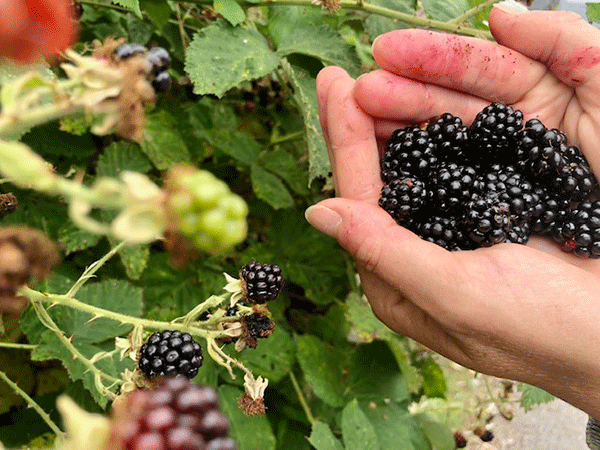Glossy blackberries ripening everywhere, the start of the new school term and cosy nights in. There’s change, the air is fresher, cooler. I spoon blackberries onto my morning porridge as I get ready for my day with Food in Community, a Devon-based not-for-profit tackling poverty, social isolation and waste.
We are planning how to manage the predicted extra demand for food aid brought about by end of furlough, rising energy prices and the upcoming loss of the £20 per week uplift to Universal Credit. Sabine Goodwin from the Independent Food Aid Network (IFAN), writing in the British Medical Journal, describes this as a “perfect storm”, whilst Citizen’s Advice estimate that the Universal Credit cut could drive a further 2.3 million people into debt.
Already, there are signs of increased financial distress. Health and social care professionals can request a same day emergency doorstep delivery of fresh food and a voucher from Food in Community for their clients. Over the summer, requests came in to help people who hadn’t eaten due to lack of money.

Joe* had not eaten for four days. He worked as a freelance, but work dried up and then a newly diagnosed health condition meant applying for benefits. “I’ve worked all my life, I never imagined struggling to afford food,” he says. “But now I have spent my savings, I have debt and cannot afford to buy food as well as make the repayments.”
He is not alone. An extra nine million people increased their borrowing over the pandemic to stay afloat. Seeking advice from our food box recipients, there are simple, practical steps we can all take:
– Recognise that money issues affect people from diverse backgrounds. If your friend doesn’t want to meet at a café, or share a paid activity, they might be struggling with money. Tea at home, blackberry picking, or even a phone call or message to stay in touch are low-cost alternatives.
– Wanting to reciprocate is human nature. Offering to pay for a friend’s lunch might create an uncomfortable situation, but swapping other support such as childcare might work.
– Talking about money should be normal. Can you commit to having a conversation with two friends or family members about money, and ask each of them to do the same? Knowing where to go for money advice should our circumstances change is useful and it will hopefully reach people in need of it.
Things to mention that are easy to remember and find on the internet:
– Citizens Advice and Turn2us for information and advice
– Your local council website – search for ‘benefits’
– Step Change and Christians Against Poverty UK for free debt management















0 Comments